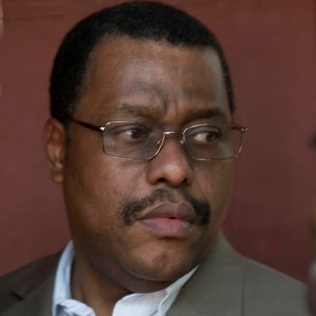President Martelly made headlines last week when a copy of his plan to reconstitute the army leaked. The Armed Forces of Haiti (FAdH) have been out of commission since President Jean-Bertrand Aristide responded to popular will by disbanding the military in April of 1995.
Understanding why the current debate over reinstatement is so heated requires historical perspective. In this piece, we touch on two reasons why the revival of the FAdH evokes such strong emotions.
_
Human Rights and Government Power: FAdH’s Dark Past
The security apparatus (military, policing, and intelligence) that developed under the rule of Papa and Baby Doc Duvalier was complex and powerful. In the late 1970s, at the height of Baby Doc’s rule, it had become a flexible, multi-faceted tool of state repression.
The 60,000-100,000 citizens killed by the Duvaliers is a testament to the fact that their reign was only as strong as their military might. This military might was organized into five main branches (see figure).

_
The clear delineations suggested by the figure, however, mask substantial overlap between the categories listed above.
For instance, the FAdH controlled all police functions. Therefore, of the roughly 33,000 employed as part of the security force, 23,000 (9,000 soldiers and 14,000 police) answered to the military command.
In addition to controlling the Military Police, the FAdH ran the prison system [1]. The pinnacle of this system was called Fort Dimanche – at times referred to as “the Auschwitz of Haiti” – where political prisoners and suspected members of the opposition met horrible fates.
Moreover, the FAdH had a role in training members of the three other security sector branches [2]. Two of these – the Presidential Guard and the Leopard Corps – were primarily tasked with protecting the president. However, the Volunteers for National Security – or, as they were more commonly called, the Tonton Macoutes – are widely considered to have perpetrated the worst of the abuses. The Council on Hemispheric Affairs says the Macoutes became the “central nervous system of [the Duvaliers’] reign of terror” by utilizing “continuous threats… as well as frequent random executions.”
While the relationship between the Macoutes and the FAdH was characterized as much by rivalry as cooperation, they complemented one another as tools for repressing the Haitian people. Thus, until Baby Doc’s ouster in 1986, the FAdH was the lynchpin of a vast apparatus of state terror that propped up two brutal dictators from 1957-1986. For obvious reasons, their reign is prominent in Haiti’s historical memory. The direct concern is, of course, that the FAdH would again be used to repress the people, violate human rights, and support authoritarian leadership.
_
Threat to Stability: The FAdH After Duvalier
In the decade after Duvalier’s fall, many facets of the security apparatus resurfaced with demands or power grabs, preventing stable governance and creating social tension.
Unwilling to Let Go of Power
First, a Haitian general named Henri Namphy took power after Duvalier fell. Two years later, when Haiti’s first elections were scheduled, Namphy orchestrated a military-led massacre of civilians, and subsequently blamed the violence on terrorists as a pretext for cancelling the elections altogether [3]. A rapid succession of FAdH and Presidential Guard members wrangled over power from 1987 to 1990; their consistent use of brutal tactics earned this era the title “Duvalierism without Duvalier.”
When free, fair elections were finally held, Jean-Bertrand Aristide won by a large margin and assumed the presidency in 1991. Yet within a year, a joint FAdH-Military Police force deposed him in order to restore military rule under General Raoul Cédras [3]. The military kept up another abusive reign until 1994, when the international community intervened to restore Presidency Aristide for the twilight of his term. Still undeterred, the army demanded cabinet posts and other concessions up until the eve of the civilian government’s restoration.
Thus, in the first five years after Duvalier, the FAdH, the Military Police, and the Presidential Guard all attempted to seize power at one point or another. But it didn’t stop there.
Undermining Democracy
Following reinstatement, President Aristide attempted to change this historical pattern of repression and coups by disbanding the Haitian army – a move supported by the large majority of Haiti’s population. Unsurprisingly, many in the army claimed the move was illegal. They subsequently militated for compensation without conditions for disarmament or demobilization, which they received ($28 million) in 2005.
Nonetheless, many discontented ex-army members joined paramilitary groups like the Front for the Advancement and Progress of Haiti (FRAPH) [3], which was a “death squad” dominated by former Macoutes and led by the CIA-bankrolled thug Emmanuel Constant. Worse still, after US-backed paramilitaries like FRAPH overthrew President Aristide’s democratically elected government for a second time in 2004-05, the US and UN paved the way for the ex-FAdH criminals among them to be integrated into the new Haitian National Police.
_
Return to the Past
With President Martelly planning to activate 500 soldiers this month, the army’s return appears imminent. Unfortunately, the collective suffering caused by the army and its remnant forces over decades of human rights atrocities assures that reconstituting the FAdH can only be seen as a return to Haiti’s oppressive past.
[Corrected 10/10/11: An earlier version of this article referred to the police under Duvalier as the Haitian National Police. Only the reconstituted, post-Duvalier police force went by this name.]
—
[1] Sarah Meharg and Aleisha Arnusch. Security Sector Reform: A Case Study Approach to Transition and Capacity Building. Strategic Studies Institute. 2010.
[2] Amnesty International. You Cannot Kill The Truth: The Case Against Jean-Claude Duvalier. 2011.
[3] Kathleen Marie Whitney. Sin, FRAPH, and the CIA: U.S. Covert Action in Haiti. Southwestern Journal of Law and Trade in the Americas, Vol. 3, Issue 2, pp. 303-32, 1996.




 Posted by Nathan Yaffe
Posted by Nathan Yaffe 





